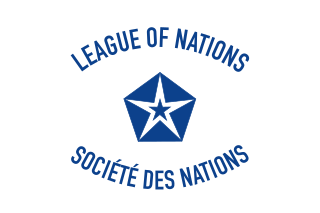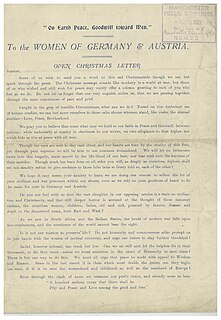Related Research Articles

The League of Nations was the first worldwide intergovernmental organisation whose principal mission was to maintain world peace. It was founded on 10 January 1920 by the Paris Peace Conference that ended the First World War. The main organization ceased operations on 20 April 1946 but many of its components were relocated into the new United Nations.

The Independent Labour Party (ILP) was a British political party of the left, established in 1893, when the Liberals appeared reluctant to endorse working-class candidates, representing the interests of the majority. A sitting independent MP and prominent union organiser, Keir Hardie, became its first chairman.

Arthur Henderson was a British iron moulder and Labour politician. He was the first Labour cabinet minister, won the Nobel Peace Prize in 1934 and, uniquely, served three separate terms as Leader of the Labour Party in three different decades. He was popular among his colleagues, who called him "Uncle Arthur" in acknowledgement of his integrity, his devotion to the cause and his imperturbability. He was a transitional figure whose policies were, at first, close to those of the Liberal Party. The trades unions rejected his emphasis on arbitration and conciliation, and thwarted his goal of unifying the Labour Party and the trade unions.

Edgar Algernon Robert Gascoyne-Cecil, 1st Viscount Cecil of Chelwood,, known as Lord Robert Cecil from 1868 to 1923, was a British lawyer, politician and diplomat. He was one of the architects of the League of Nations and a defender of it, whose service to the organisation saw him awarded the Nobel Peace Prize in 1937.

The New Communist Party of Britain is a anti-revisionist Marxist-Leninist communist party in Britain. The origins of the NCP lie in the Communist Party of Great Britain from which it split in 1977. The organisation takes an anti-revisionist stance on Marxist-Leninism and is opposed to Eurocommunism. After the fall of the Soviet Union the party was one of two original British signatories to the Pyongyang Declaration in 1992. It publishes a newspaper named The New Worker.

Goldsworthy Lowes Dickinson, known as Goldie, was a British political scientist and philosopher. He lived most of his life at Cambridge, where he wrote a dissertation on Neoplatonism before becoming a fellow. He was closely associated with the Bloomsbury Group.

George Gilbert Aimé Murray was an Australian-born British classical scholar and public intellectual, with connections in many spheres. He was an outstanding scholar of the language and culture of Ancient Greece, perhaps the leading authority in the first half of the twentieth century. He is the basis for the character of Adolphus Cusins in his friend George Bernard Shaw's play Major Barbara, and also appears as the chorus figure in Tony Harrison's play Fram.
The United Labour Party (ULP) of New Zealand was an early left-wing political party. Founded in 1912, it represented the more moderate wing of the labour movement. In 1916 it joined with other political groups to establish the modern Labour Party.
The International Arbitration League was a society of pacifists run by working-class men.
The Covenant of the League of Nations was the charter of the League of Nations. It was signed on 28 June 1919 as Part I of the Treaty of Versailles, and became effective together with the rest of the Treaty on 10 January 1920.

The Communist League was a small far-left organisation in the United Kingdom which existed during the year of 1919. Its stated goal was to establish a network of workers' councils that would "resist all legislation and industrial action directed against the working class, and ultimately assuming all power, establish a working class dictatorship".

Opposition to World War I included socialist, anarchist, syndicalist, and Marxist groups on the left, as well as Christian pacifists, Canadian and Irish nationalists, women's groups, intellectuals, and rural folk.

The Sheffield Trades and Labour Council, usually known as the Sheffield Trades Council, is a labour organisation uniting trade unionists in Sheffield.

A peace movement is a social movement which seeks to achieve ideals, such as the ending of a particular war or minimizing inter-human violence in a particular place or situation. They are often linked to the goal of achieving world peace. Some of the methods used to achieve these goals include advocacy of pacifism, nonviolent resistance, diplomacy, boycotts, peace camps, ethical consumerism, supporting anti-war political candidates, supporting legislation to remove profits from government contracts to the military–industrial complex, banning guns, creating tools for open government and transparency, direct democracy, supporting whistleblowers who expose war crimes or conspiracies to create wars, demonstrations, and political lobbying. The political cooperative is an example of an organization which seeks to merge all peace-movement and green organizations; they may have diverse goals, but have the common ideal of peace and humane sustainability. A concern of some peace activists is the challenge of attaining peace when those against peace often use violence as their means of communication and empowerment.

The Fabian Society is a British socialist organisation whose purpose is to advance the principles of democratic socialism via gradualist and reformist effort in democracies, rather than by revolutionary overthrow. The Fabian Society was also historically related to radicalism, a left-wing liberal tradition.
The League of Nations Union (LNU) was an organization formed in October 1918 in Great Britain to promote international justice, collective security and a permanent peace between nations based upon the ideals of the League of Nations. The League of Nations was established by the Great Powers as part of the Paris Peace Treaties, the international settlement that followed the First World War. The creation of a general association of nations was the final one of President Woodrow Wilson's Fourteen Points. The LNU became the largest and most influential organisation in the British peace movement. By the mid-1920s, it had over a quarter of a million registered subscribers and its membership eventually peaked at around 407,775 in 1931. By the 1940s, after the disappointments of the international crises of the 1930s and the descent into World War II, membership fell to about 100,000.

The Open Christmas Letter was a public message for peace addressed "To the Women of Germany and Austria", signed by a group of 101 British suffragists at the end of 1914 as the first Christmas of the First World War approached. The Open Christmas Letter was written in acknowledgment of the mounting horror of modern war and as a direct response to letters written to American feminist Carrie Chapman Catt, the president of the International Woman Suffrage Alliance (IWSA), by a small group of German women's rights activists. Published in January 1915 in Jus Suffragii, the journal of the IWSA, the Open Christmas Letter was answered two months later by a group of 155 prominent German and Austrian women who were pacifists. The exchange of letters between women of nations at war helped promote the aims of peace, and helped prevent the fracturing of the unity which lay in the common goal they shared, suffrage for women.

The League to Enforce Peace was a non-state American organization established in 1915 to promote the formation of an international body for world peace. It was formed in Philadelphia by American citizens concerned by the outbreak of World War I in Europe. Support for the league dissolved and it ceased operations by 1923.
The League of Nations Society was a political group devoted to campaigning for an international organisation of nations, with the aim of preventing war.
The United Kingdom and the League of Nations played central roles in the diplomatic history of the interwar period 1920-1939 and the search for peace. British activists and political leaders help plan and found the League of Nations, provided much of the staff leadership, and Britain played a central role in most of the critical issues facing the League. The League of Nations Union was an important private organization that promoted the League in Britain. By 1924 the League was broadly popular and was featured in election campaigns. The Liberals were most supportive; the Conservatives least so. From 1931 onward, major aggressions by Japan, Italy, Spain and Germany effectively ruined the League in British eyes.
References
- 1 2 Kaiga, Sakiko (2021). Britain and the Intellectual Origins of the League of Nations, 1914–1919. Cambridge University Press. pp. 39–65. ISBN 978-1-108-48917-1.
- 1 2 3 4 Cline, Catherine Ann (1963). Recruits to Labour . Syracuse, New York: Syracuse University Press. p. 15 –17.